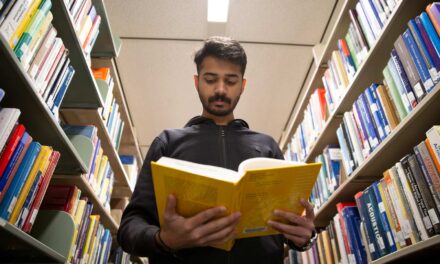
4 inducted into Fulton Schools Hall of Fame
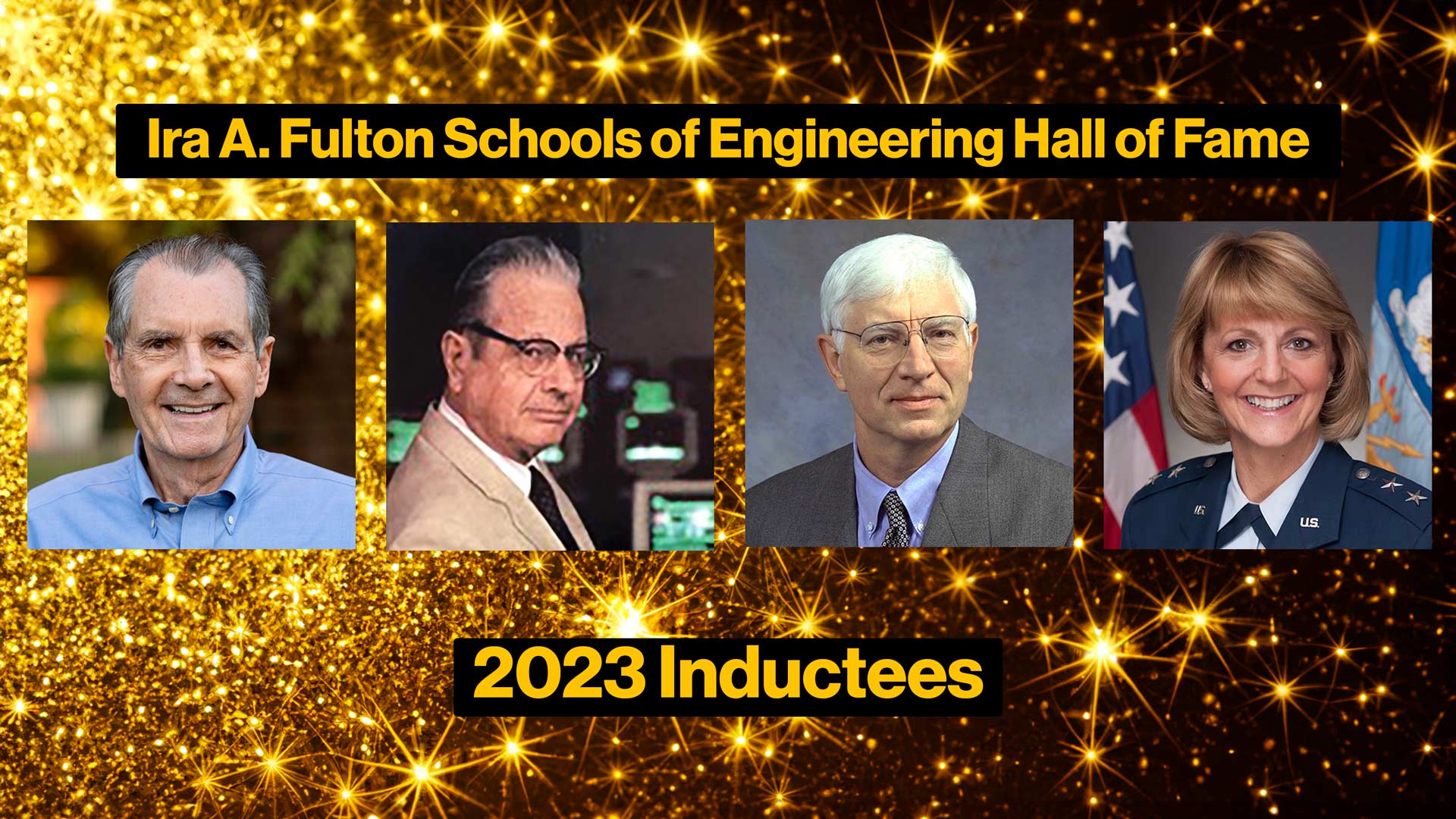
The Ira A. Fulton Schools of Engineering at Arizona State University recently hosted the 2023 Fulton Schools of Engineering Hall of Fame ceremony in which the school welcomed four new honorees into the ranks.
The Fulton Schools are a hub for research progress, innovative engineering education, and impactful connections to the community and a rapidly evolving industry landscape. Throughout its decadeslong journey to becoming an engineering and technology leader, hundreds of thousands of faculty, students, collaborators and stakeholders have been and remain part of the Fulton Schools community.
The Fulton Schools of Engineering Hall of Fame provides a platform to highlight the achievements of visionary individuals whose accomplishments, commitment to engineering and lifetime of impact personify what it means to be a Fulton Schools engineer.
“Each of these exceptional individuals exemplifies our values of excellence, innovation, bold thinking and, most importantly, building a foundation for everyone to succeed,” said Kyle Squires, dean of the Fulton Schools and ASU’s vice provost of engineering, computing and technology, who served as the emcee for the ceremony.
Inductees George Beakley Jr., Jon Bayless, Armand Neukermans and Margaret Woodward were recognized as exemplars of the Fulton Schools’ vision of access, excellence and innovation.
George Beakley Jr.
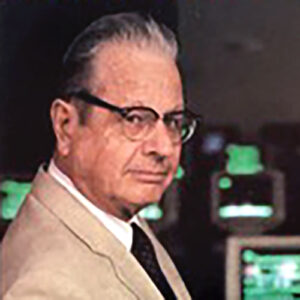
George Beakley Jr.
George Beakley Jr., a World War II veteran, was no stranger to taking risks in the name of reward. Raised on a cotton and cattle ranch in West Texas, he learned the value of hard work and attention to detail early on. Beakley valued education and attended Baylor University, Stanford, Texas Tech, the University of Texas and Oklahoma State University, culminating in doctorate degrees in both mechanical engineering and industrial engineering.
In 1956, he accepted a job with a startup engineering program at a small teachers college in Tempe, Arizona, — at the time known as Arizona State College.
Beakley spent his first year at the college, which is now Arizona State University, collaborating with Lee Thompson, then the dean of engineering, implementing an entirely new engineering education method that provided a bridge between science, math and engineering called the Engineering Core Segment. Their revolutionary improvements to engineering education methods still carry a fundamental role in the current success of the Fulton Schools and the many students who have passed through the program. To date, more than a million students have benefited from his contributions to engineering education.
George Beakley III, Beakley’s son, said of his father, “It’s an honor for me and my family to have his legacy remembered as one of the founders of the engineering college here at Tempe.”
Throughout his career, Beakley authored 29 textbooks, initiated the first computer engineering curriculum in the country, and was the recipient of many awards, including the Carlson Award and the Marlowe Award.
Jon Bayless
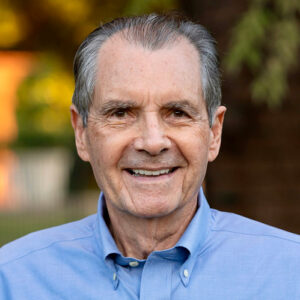
Jon Bayless
Jon Bayless graduated from ASU’s College of Engineering and Applied Sciences with a doctorate in electrical engineering in 1967. His engineering career started at Motorola in Scottsdale, Arizona, where he worked on the Apollo S-Band communication system. He later taught in the electrical engineering departments at Southern Methodist University in Dallas, where he co-authored a textbook, and at two universities in the Washington, D.C., area.
Bayless went on to perform system engineering work at the Defense Communications Agency and, after publishing a summary of his work in IEEE Spectrum, was recruited back to Dallas to join Arthur Collins — the founder of Collins Radio.
At Collins Radio, he helped develop a plan to transition the telecommunications network from analog to digital technology. That work led Bayless to join Sevin Rosen Funds, a venture capital fund, where he has been a general partner since its founding in 1981. Sevin Rosen Funds focuses on early stage investing in technology-based businesses.
Bayless’ expertise led him to contribute to startups that have gone on to be acquired by major corporations. He later formed a family business focusing on seed investments for other emerging businesses.
At ASU, Bayless has supported the continued entrepreneurial growth and IP translation on the SkySong Innovations advisory board to enhance ASU’s technology transfer portfolio.
Bayless says his success stems from the lessons he learned during his graduate studies at ASU.
“One of the things that I learned here was how to manage my time and how to work hard,” he says. “I don’t take myself too seriously, but I’m very serious about my work.”
Bayless also faced challenges as a grad student and recalls the community of support he found at ASU. He remembers how faculty helped him find jobs around campus to help improve his financial situation. Today, he pays forward the aid he once needed by supporting students with financial struggles.
For any Fulton Schools student, he offers the following advice:
“If I were starting over, one thing I would want to do is be true to myself. I’d find things I like to do best and do those,” he says. “You need to enjoy your job, so you need to find what you’re best at. If you’re going to be working for a lifetime, it’s important to enjoy your work.”
Armand Neukermans
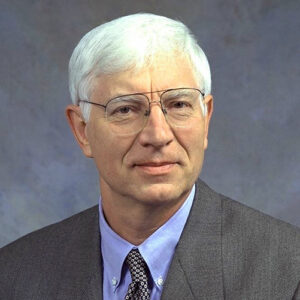
Armand Neukermans
Armand Neukermans holds electrical engineering and mechanical engineering bachelor’s degrees from Louvain University, a master’s degree in electrical engineering from ASU, and a doctorate in applied physics from Stanford University.
His prolific career in management, research and entrepreneurship has included prominent management positions at industry giants like Hewlett-Packard, Xerox and General Electric. During his tenure at Hewlett-Packard, Neukermans was a part of the team that invented the iconic inkjet printer.
Neukermans founded and served as chairman and CTO of Xros, an optical switch company that was acquired by Nortel Networks in 2000. He is the author of 40 publications and is the inventor of more than 80 patents in diverse fields.
In 2001, Neukermans was named Silicon Valley Inventor of the Year, won the Lifetime Achievement Award for Entrepreneurship from Belcham, and was knighted as an “Officer in the Order of Leopold” by the Belgian Crown.
Neukermans has served on the boards of both public and private companies and, since his retirement, has been involved in environmental projects and in fostering the causes of various social entrepreneurs, such as D-Rev, Jaipur Foot and Benetech’s Landmine project. The Stanford-Jaipur Knee project, initiated and guided by the Neukermans Trust at Stanford, has resulted in a widely acclaimed $20 knee prosthesis, of which more than 25,000 are now used worldwide.
Later, Eliane and Armand Neukermans were recipients of the 2021 Avenidas Lifetimes Achievement Award.
Over the last 14 years, Neukermans has directed a group of volunteer scientists and engineers on an innovative climate mitigation effort initiated by Bill Gates. In conjunction with the University of Washington and SRI, the group is conducting technology research for cloud studies and marine cloud brightening with seawater nuclei to cool the Earth, and for particle dispersal for the Harvard ScopEx stratosphere project.
“The short period when I was at ASU had a profound effect on my career and the rest of my life,” Neukermans said. “I doubt my career would be the same without my time at ASU.”
He noted that though the landscape has changed, the challenging environment and program quality at ASU are still extraordinary.
“ASU is working on problems of a magnitude and scale that we have never faced before,” Neukermans said. “To all of you young engineers out there, do not be afraid to work on new and relevant problems.”
Margaret Woodward
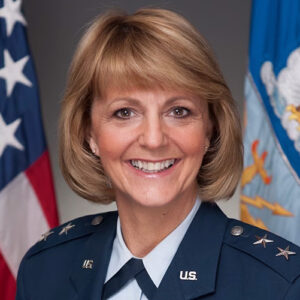
Margaret Woodward
Margaret Woodward served 32 years in the U.S. Air Force following her graduation from ASU in 1982. During her service, she flew more than 3,800 hours in nine different aircraft, demonstrating unparalleled leadership in the face of world conflicts. She commanded a squadron, a group, two wings, a numbered Air Force and a Center.
Among her many other achievements, Maggie commanded the lead aircraft during Operation Just Cause. She commanded the largest composite tanker squadron since Vietnam during the war in Kosovo. For eight months following the attack on the Pentagon in 2001, she supported the response as Chief of the Air Force Operations and Plans Action Group. Woodward also commanded combat operations in Libya, becoming the first woman to command a Combat Air Campaign.
Maggie has also commanded all Air Forces in Africa, the Air Force Safety Center, and directed corrective measures in response to serial sexual assault concerns in Air Force Basic Training.
In 2011, Woodward was recognized as one of Time Magazine’s 100 most influential people. At the time of her retirement, Woodward achieved the rank of Major General, the highest permanent peacetime rank the Air Force offers.
Despite these many accolades, Woodward says she once struggled academically in ASU’s demanding engineering program. She advises students to stick with it and not give up when it gets hard and considers her accomplishments a testament to the benefits of being challenged by an effectively designed program.
“Education is the foundation of everything,” Woodward said. “Not only did ASU educate me in engineering, but, more importantly, in how to logically think through things and work through problems. That lesson served me well my entire career, including leading combat missions in Libya.”
Now, Woodward is the acting Air Force senior mentor responsible for educating the next generation of Air Force senior leadership.
The Hall of Fame ceremony not only recognizes the accomplishments of these exceptional individuals but also emphasizes the enduring impact of the Fulton Schools community on engineering education, research and industry around the world. As the Fulton Schools continues to evolve as a hub for innovation, these inductees stand as beacons of inspiration for current and future generations of Fulton Schools engineers, embodying the spirit of excellence and dedication that defines the engineering legacy at ASU.
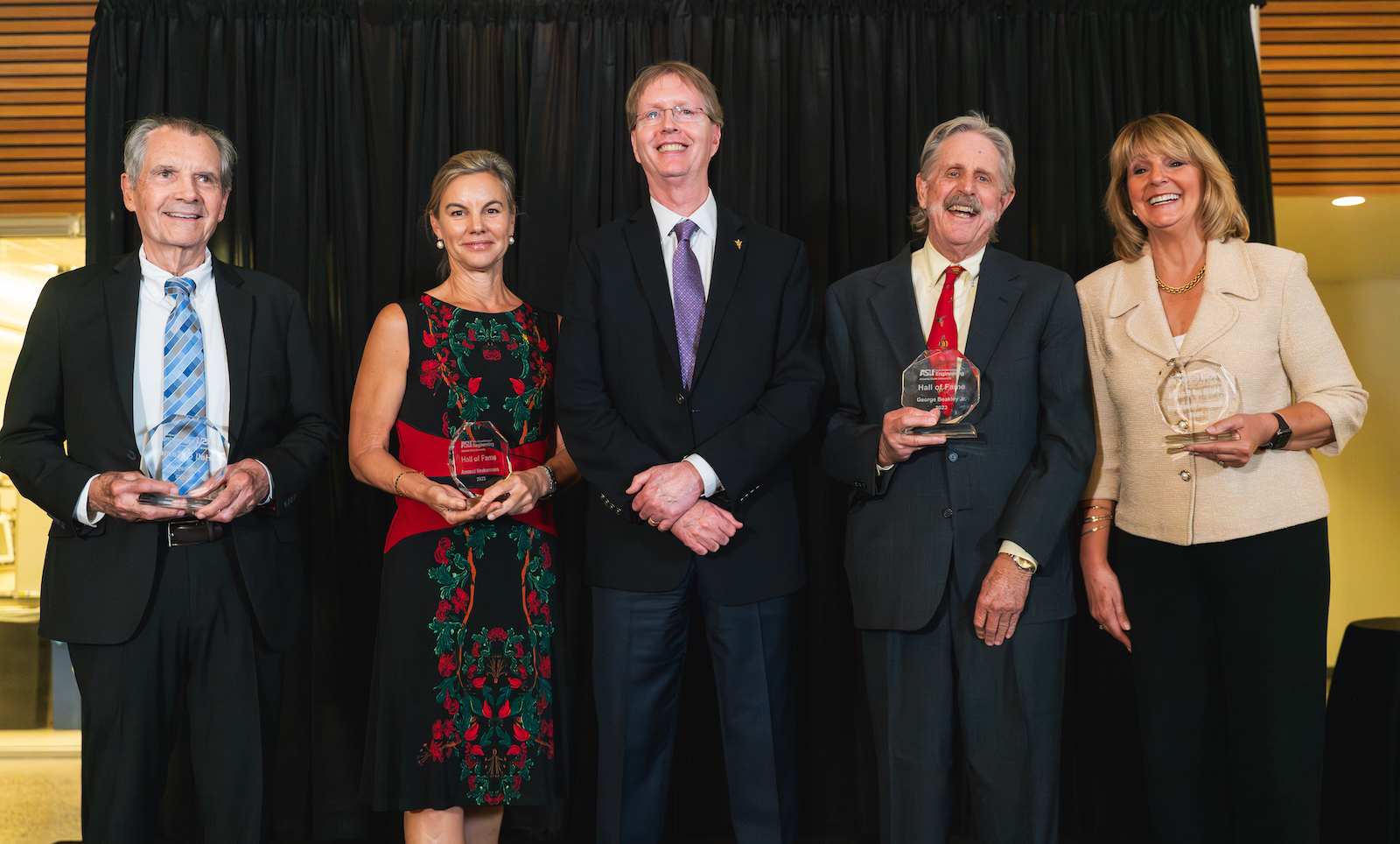
Kyle Squires (center), dean of the Ira A. Fulton Schools of Engineering, poses with 2023 inductees into the Fulton Schools Hall of Fame — (left to right) Jon Bayless, Katrien Neukermans (accepting the award of behalf of her father Armand Neukermans), George Beakley III (accepting the award on behalf of his father George Beakley Jr.), and Margaret Woodward.
















